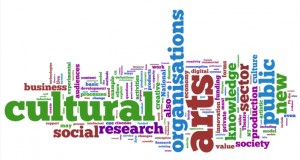Can the arts lead the way with new technologies? In this extract from their ‘Not rocket science’ report, Hasan Bakhshi, Radhika Desai and Alan Freeman argue that the arts can and should.

Wordle_Not Rocket Science
Imagine that the music industry in the 1990’s had foreseen its future. Suppose it anticipated the iPod, the Arctic Monkeys, High Definition (HD) remote performance, the O2 Arena and soaring live audiences. Imagine if it had prepared for the calamities of file sharing, downloading and the demise of the CD. By leading, instead of following these changes and trends, could it have led the reshaping of society through new technologies? Could it have facilitated an explosion of artistic potential, deploying the creative imagination of the industry’s workforce to open the way to hitherto unimaginable new audiences, new modes of participation in the arts and new art forms?
We say yes to all these questions and argue that arts organisations should actively and systematically invest in Research and Development (R&D), which is often viewed as the preserve of the sciences. They should use the knowledge generated to stay ahead of the technological curve, to lead artistic and social change, and to generate new art forms or genres, new forms of engagement and new audiences.
R&D can assess on a calculated basis in advance what the effects and potential might be, and harness these to develop new ways of exploiting new technologies, for the producers as well as the patrons of the arts. Its use, by arts organisations can and will, place an emergent mix of capabilities at the disposal of those at the ‘curtainface’ to lower the risks associated with innovation, freeing artists to experiment while limiting the financial cost of failure. More fundamentally, they can anticipate the social changes that their innovation might lead to, engaging with policy and helping both the arts and society to envisage and extend their interface. In encouraging such experimentation, they can combine intrinsic and instrumental objectives: they can develop their art, and at the same time fulfil the wider social and economic uses for it.
R&D in science requires public support, as it does in the arts. However, arts organisations are excluded from existing channels of R&D funding which are dominated at the international level by a narrow definition of research as a science activity. Such rules need revision. Arts organisations and funders need to reconceptualise their remit so as to include R&D. Both require a broad discussion between arts organisations, arts funders and policymakers.
Cultural institutions already engage in multiple aspects of R&D. Museums and galleries conduct basic research, while performing and visual arts organisations justly pride themselves on their capacity for innovation. But these capacities are not connected. Innovation is not informed by research, and research is not disseminated in a systematic way to increase innovation elsewhere. Vital opportunities to obtain knowledge are not exploited. Social and technological changes need systematic study.
Combining experimentation with cutting-edge research methods in R&D can place arts and cultural organisations at the forefront of a knowledge economy dominated by the aesthetic and intangible, extending their reach far into the material world of, say, urban design and architecture, or the Internet. Such new interfaces between arts, the economy and society promise to add higher-value human and creative content to social production in a greener ‘post-material’ economy, and potentially democratise such production and consumption. To realise its full potential, it can, and should, combine imagination with foresight – by means of Research and Development.
HASAN BAKHSHI is Research Fellow at Queensland University of Technology, Honorary Visiting Professor at City University and Director, Creative Industries in NESTA’s Policy and Research Unit. RADHIKA DESAI is Professor at the University of Manitoba and Visiting Fellow at the London School of Economics. ALAN FREEMAN is an Economist at the Greater London Authority.
Read the full report at http://www.missionmodelsmoney.org.uk/papers/not-rocket-science/. The original version of this article was published in the ArtsProfessional, Issue 213, 15 March 2010 www.artsprofessional.co.uk.
 This work is licensed under a Creative Commons Attribution-NonCommercial-ShareAlike 3.0 Australia.
This work is licensed under a Creative Commons Attribution-NonCommercial-ShareAlike 3.0 Australia.







[...] of the art delivery platform and test space for young and emerging creative professionals, whilst Hasan Bakhshi, Radhika Desai and Alan Freeman argue that the arts industry should be leading the way with new [...]